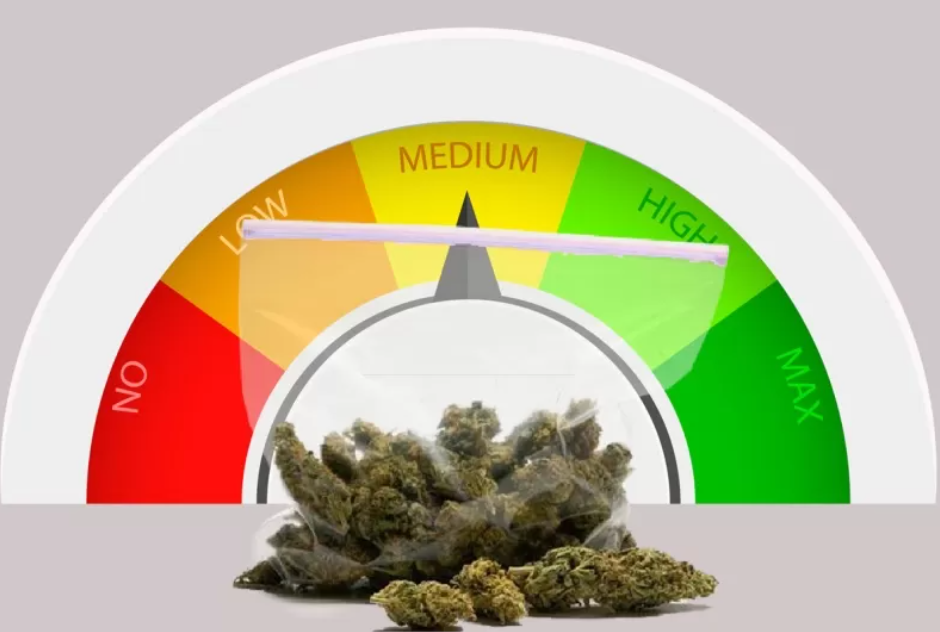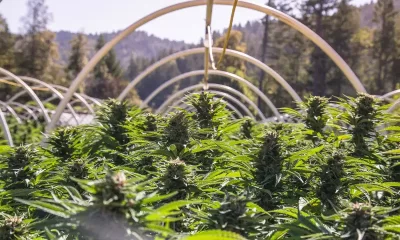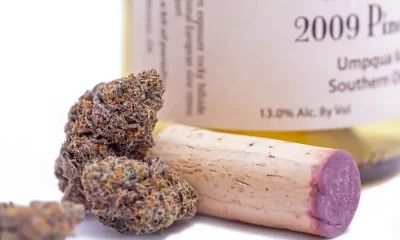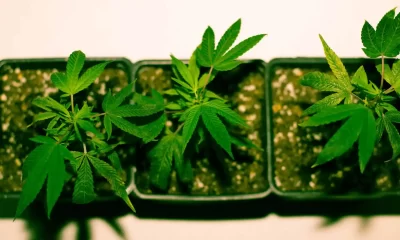Business
What are Mids? (Any Why Does Everyone in the Cannabis Industry Like to Make Fun of Them ?)

For many that are new to the cannabis industry, you might have heard the word “mid” being used repeatedly while trying to buy weed. Now I know that we all want to act like we are in tune with every lingua in the cannabis industry, but it’s okay if you’re not. All you need is the right info and you’re good to go. So, if you have been asking yourself “What are mids?”, then look no further. This article will tell you all you need to know about mids as well as the pros and cons.
Cannabis Quality Spectrum
Before we delve into what mids are, you must understand what is known as the cannabis quality spectrum. This is simply the classification of cannabis based on its quality and many cannaseurs are known to use the classification that recognizes mids. Under this classification, cannabis flowers are graded into 4; Regs, Mids, Beasters, and Headies. This classification arranges the quality of the weed from the least to the best. This means that regs are the least in terms of quality and headies are the best.
Another explanation of the cannabis quality spectrum has the marijuana flowers divided into three. This is beneficial as the three categories are low quality, medium quality, and high quality. The high-quality cannabis can further be divided into the low-high quality and high-high quality. However, since our focus is on mids, further explanations will be with respect to both classifications to better aid understanding.
What are mids?
From the earlier explanation, we already know where mids lie in the four categories of grading marijuana flowers. With respect to the three classes, mids can be regarded as the mid-point between low-quality and high-quality cannabis. This classification has brought on different names for this class of marijuana flowers over the years. This includes middle, middle shelf, the thirties, middies, and B+. All these names point to the same thing but what identifies mids are the flower variables. This includes appearance, flavor, cannabinoid content, effects, and price.
Appearance
You can easily identify mids from its appearance as many U.S. cannabis readily falls into this category. The buds are usually separated and contain few seeds and stems. It is also possible for the buds not to contain seeds at all. Mids have very few trichomes and are very bright with colored pistils and orange hairs.
Flavor
Mids have a normal flavor depending on the characteristic of the strain. They are not as harsh as regs but they aren’t without their deleterious effects. Mids are likely to make you cough and hack repeatedly.
Cannabinoid content
You guessed right by thinking that mids will have a higher cannabinoid content than regs. This means they are more likely to give better recreational and medicinal effects compared to regs. That’s just about where it ends though as beasters and headies have better cannabinoid content than mids.
Price
The cost of mids has been more regulated now that there are legal markets in different states. Nonetheless, prices vary depending on existing conditions in different states. However, mids are less expensive when compared to beasters and headies.
Pros and Cons of Moderately Good Weed
Price
One of the good things about mids which has caught the fancy of many is that it is very cheap. This means that you won’t necessarily have to break the bank whenever you want to procure your weed. This is probably why it is still a fan favorite of many, especially at such a time of increased inflation.
Color
As explained earlier, mids are properly endowed with colored pistils and orange hairs. This makes them very attractive and pleasing to the eye which then stimulates purchase. Though mids are not nearly as bright as headies, they are also so as dull as regs.
High
The type of high experienced from smoking mid-quality weed depends on the smoking experience. Veteran tokers love mids because they are bound to get their desired high easily. Others with a reduced level of experience range from feeling blasted to blazed before experiencing the desired high.
Cons
Appearance
While the color of mids gives it a big edge over regs, its appearance is still a major issue. The majority of the bud still appears brown and green despite the orange hairs and many be compressed. Mids can also contain seeds that have unpleasant harsh effects on the smoking experience. If not procured from the right source, some mids are known to be moldy. While the whole plant matter might not be engulfed in fungus, breaking it apart can show signs of fungus. If you see signs of mold in your cannabis, it’s best not to consume it for health reasons.
Comparison with other qualities of weed
Regs are at the bottom of the scale so you know what to expect to a certain degree. They are usually packaged in bricks with visible stems and seeds. They are mostly brown in color and harsh in terms of flavor which causes throat burn. They give a mellow high and promote sleep though stomach upset and respiratory issues are common side effects.
Beasters are very attractive with orange and purple hairs, trichome crystals, and an absence of stems. It has a smooth and delicious flavor depending on strain which aids the smoking experience. Beaters give a good high depending on the THC concentration of the strain. They are however more expensive than mids so get ready to spend the dollars.
Headies are what you call top-shelf material. It has no stems and seeds with a full covering of orange, purple, and green hairs as well as trichome crystals. It has a perfect flavor with no hint of harshness and high cannabinoid concentration. This makes it quite expensive but you will get your money’s worth.
Bottom line
Mids are not the perfect class of cannabis flowers but it has its perks. Depending on what you have and what you want, you can go for the best category that applies to you but mids are fairly alright.
Business
New Mexico cannabis operator fined, loses license for alleged BioTrack fraud

New Mexico regulators fined a cannabis operator nearly $300,000 and revoked its license after the company allegedly created fake reports in the state’s traceability software.
The New Mexico Cannabis Control Division (CCD) accused marijuana manufacturer and retailer Golden Roots of 11 violations, according to Albuquerque Business First.
Golden Roots operates the The Cannabis Revolution Dispensary.
The majority of the violations are related to the Albuquerque company’s improper use of BioTrack, which has been New Mexico’s track-and-trace vendor since 2015.
The CCD alleges Golden Roots reported marijuana production only two months after it had received its vertically integrated license, according to Albuquerque Business First.
Because cannabis takes longer than two months to be cultivated, the CCD was suspicious of the report.
After inspecting the company’s premises, the CCD alleged Golden Roots reported cultivation, transportation and sales in BioTrack but wasn’t able to provide officers who inspected the site evidence that the operator was cultivating cannabis.
In April, the CCD revoked Golden Roots’ license and issued a $10,000 fine, according to the news outlet.
The company requested a hearing, which the regulator scheduled for Sept. 1.
At the hearing, the CCD testified that the company’s dried-cannabis weights in BioTrack were suspicious because they didn’t seem to accurately reflect how much weight marijuana loses as it dries.
Company employees also poorly accounted for why they were making adjustments in the system of up to 24 pounds of cannabis, making comments such as “bad” or “mistake” in the software, Albuquerque Business First reported.
Golden Roots was fined $298,972.05 – the amount regulators allege the company made selling products that weren’t properly accounted for in BioTrack.
The CCD has been cracking down on cannabis operators accused of selling products procured from out-of-state or not grown legally:
- Regulators alleged in August that Albuquerque dispensary Sawmill Sweet Leaf sold out-of-state products and didn’t have a license for extraction.
- Paradise Exotics Distro lost its license in July after regulators alleged the company sold products made in California.
Golden Roots was the first alleged rulebreaker in New Mexico to be asked to pay a large fine.
Source: https://mjbizdaily.com/new-mexico-cannabis-operator-fined-loses-license-for-alleged-biotrack-fraud/
Business
Marijuana companies suing US attorney general in federal prohibition challenge

Four marijuana companies, including a multistate operator, have filed a lawsuit against U.S. Attorney General Merrick Garland in which they allege the federal MJ prohibition under the Controlled Substances Act is no longer constitutional.
According to the complaint, filed Thursday in U.S. District Court in Massachusetts, retailer Canna Provisions, Treevit delivery service CEO Gyasi Sellers, cultivator Wiseacre Farm and MSO Verano Holdings Corp. are all harmed by “the federal government’s unconstitutional ban on cultivating, manufacturing, distributing, or possessing intrastate marijuana.”
Verano is headquartered in Chicago but has operations in Massachusetts; the other three operators are based in Massachusetts.
The lawsuit seeks a ruling that the “Controlled Substances Act is unconstitutional as applied to the intrastate cultivation, manufacture, possession, and distribution of marijuana pursuant to state law.”
The companies want the case to go before the U.S. Supreme Court.
They hired prominent law firm Boies Schiller Flexner to represent them.
The New York-based firm’s principal is David Boies, whose former clients include Microsoft, former presidential candidate Al Gore and Elizabeth Holmes’ disgraced startup Theranos.
Similar challenges to the federal Controlled Substances Act (CSA) have failed.
One such challenge led to a landmark Supreme Court decision in 2005.
In Gonzalez vs. Raich, the highest court in the United States ruled in a 6-3 decision that the commerce clause of the U.S. Constitution gave Congress the power to outlaw marijuana federally, even though state laws allow the cultivation and sale of cannabis.
In the 18 years since that ruling, 23 states and the District of Columbia have legalized adult-use marijuana and the federal government has allowed a multibillion-dollar cannabis industry to thrive.
Since both Congress and the U.S. Department of Justice, currently headed by Garland, have declined to intervene in state-licensed marijuana markets, the key facts that led to the Supreme Court’s 2005 ruling “no longer apply,” Boies said in a statement Thursday.
“The Supreme Court has since made clear that the federal government lacks the authority to regulate purely intrastate commerce,” Boies said.
“Moreover, the facts on which those precedents are based are no longer true.”
Verano President Darren Weiss said in a statement the company is “prepared to bring this case all the way to the Supreme Court in order to align federal law with how Congress has acted for years.”
While the Biden administration’s push to reschedule marijuana would help solve marijuana operators’ federal tax woes, neither rescheduling nor modest Congressional reforms such as the SAFER Banking Act “solve the fundamental issue,” Weiss added.
“The application of the CSA to lawful state-run cannabis business is an unconstitutional overreach on state sovereignty that has led to decades of harm, failed businesses, lost jobs, and unsafe working conditions.”
Business
Alabama to make another attempt Dec. 1 to award medical cannabis licenses

Alabama regulators are targeting Dec. 1 to award the first batch of medical cannabis business licenses after the agency’s first two attempts were scrapped because of scoring errors and litigation.
The first licenses will be awarded to individual cultivators, delivery providers, processors, dispensaries and state testing labs, according to the Alabama Medical Cannabis Commission (AMCC).
Then, on Dec. 12, the AMCC will award licenses for vertically integrated operations, a designation set primarily for multistate operators.
Licenses are expected to be handed out 28 days after they have been awarded, so MMJ production could begin in early January, according to the Alabama Daily News.
That means MMJ products could be available for patients around early March, an AMCC spokesperson told the media outlet.
Regulators initially awarded 21 business licenses in June, only to void them after applicants alleged inconsistencies with how the applications were scored.
Then, in August, the state awarded 24 different licenses – 19 went to June recipients – only to reverse themselves again and scratch those licenses after spurned applicants filed lawsuits.
A state judge dismissed a lawsuit filed by Chicago-based MSO Verano Holdings Corp., but another lawsuit is pending.
Source: https://mjbizdaily.com/alabama-plans-to-award-medical-cannabis-licenses-dec-1/
-

 Business2 years ago
Business2 years agoPot Odor Does Not Justify Probable Cause for Vehicle Searches, Minnesota Court Affirms
-

 Business2 years ago
Business2 years agoNew Mexico cannabis operator fined, loses license for alleged BioTrack fraud
-

 Business2 years ago
Business2 years agoAlabama to make another attempt Dec. 1 to award medical cannabis licenses
-

 Business2 years ago
Business2 years agoWashington State Pays Out $9.4 Million in Refunds Relating to Drug Convictions
-

 Business2 years ago
Business2 years agoMarijuana companies suing US attorney general in federal prohibition challenge
-

 Business2 years ago
Business2 years agoLegal Marijuana Handed A Nothing Burger From NY State
-

 Business2 years ago
Business2 years agoCan Cannabis Help Seasonal Depression
-

 Blogs2 years ago
Blogs2 years agoCannabis Art Is Flourishing On Etsy













